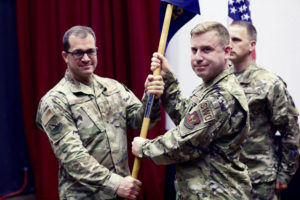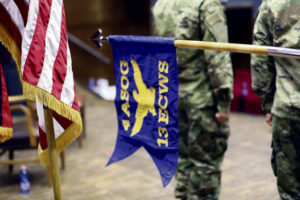
The 7th Expeditionary Combat Weather Squadron became the 13th Expeditionary Combat Weather Squadron during an assumption of command ceremony held June 1 at U.S. Army Ansbach Garrison’s Storck Barracks Airfield.
The 13th ECWS, which falls under the 4th Air Support Operations Group in the 435th Air Ground Operations Wing, is a specialized weather squadron focusing on weather intelligence tracking for U.S. Army Europe-Africa forces.
The 13th ECWS’s new commander, U.S. Air Force Maj. Nicholas J. Reitz, assumed command during the ceremony and hopes the new squadron designation will further facilitate communications between the two services.
“I plan on providing a new level of support to all of our ‘Blackcat’ Airmen, the efforts of which will make their lives easier and enhance their ability to focus on our mission,” Reitz said. “I also plan on empowering our Airmen to make tough decisions, which will enhance warfighting capabilities.”
The unit was redesignated to help streamline their areas of support, consolidate leadership duties and focus the 13th ECWS’s duties on a singular mission. The redesignation also distinguishes the unit from the 7th Combat Weather Squadron, a unit with a separate European Command mission.
“It improves our effectiveness as a unit and gives us a distinct identity, which helps us operate in a more efficient manner,” said U.S. Air Force Chief Master Sgt. Jason Ronsse, United States Air Forces in Europe – Air Forces Africa Weather MAJCOM functional manager.
The designation hails from the 13th Weather Squadron, a unit retired in 1951, and reactivates it as the 13th ECWS.

The unit is one of the few expeditionary combat weather squadrons in the service that solely supports and embeds with U.S. Army Soldiers who lack weather intelligence capabilities of their own. The unit provides Airmen an opportunity to have a joint service experience.
“Anywhere the Army goes, we’re going with them to ensure that no matter what they (need) they have it,” Ronsse said. “We also take care of the brigade combat teams and track vehicles. We make sure operations can be successful.”
The 13th ECWS will show their newfound strength by continuing to do what they do best: supporting their fellow service members.
“The Army expects us to be able to shoot, move and communicate just like they do,” Ronsse said. “We’re ready to fight. As I always say, ‘(We’re) ready to brief aircraft in the morning and defend the base in the afternoon.’”


